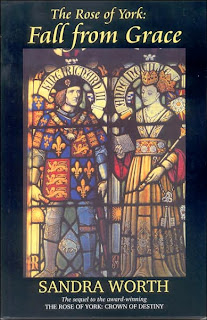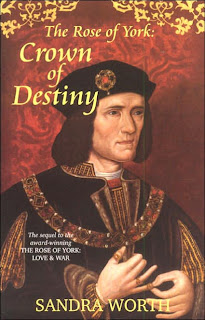An Interview and an Exciting Free Giveaway
 Lady of the Roses by Sandra Worth
Lady of the Roses by Sandra Worth
Anyone who knows me knows that I have always been interested in English monarchical history. So when I got an email from Sandra Worth about her new release, Lady of the Roses I knew I wanted to get a hold of this book.
Lady of the Roses is about a young lady, Isobel, who has been serving in the court of the Lancastrian Marguerite, Queen of England. Things are complicated by the fact that Isobel, despite being approached by many suitors, finds her self in love with John Neville, a Yorkist. The two lovers must find a way to survive the dangerous civil war taking place in England, the bloody march on London by the Duke of Lancaster, and the violent madness of Queen Marguerite.
Sandra Worth is well known for her dedication to research and her knowledge of the time period she writes in. Her previous novels include the Rose of York trilogy made up of: The Rose of York: Fall From Grace, The Rose of York: Love and War, and The Rose of York: Crown of Destiny.

with Author Sandra Worth

I am very happy to have had the chance to sit down Sandra for an interview a few days ago. I can say this for certain, Worth is great to talk to and really quite nice. I have been impressed by Sandra's command for the British royal line especially during the reigns of the Plantagenets and Yorks. Worth is a sharp author with a keen historical eye and a talent for writing quality historical fiction. I think this interview gives you a chance to see how and why...
Kelly Hewitt: Lady of the Roses is your first new novel since finishing your award-winning Rose of York trilogy which began with the reign of Edward IV, continued through fall of Richard III, and ended with the rise of Henry VII who came to the throne after the Battle of Bosworth. This new novel takes place during the reign of the Lancastrian King Henry VI amidst the rumblings of the War of Roses. Was it hard to change gears, moving from the beginning of the Tudor dynasty to the final years of the Lancastrian royal line?
Sandra Worth: No, not really. This earlier period that gives the Neville viewpoint in the run-up to the Battle of Towton is rich in drama and history. I was glad to do it, since no one had yet attempted it, either in fiction or in biography. My hope is that Isobel's story might shed light on how the various well-known incidents of that chaotic era can be linked, and perhaps explain what seems to be a dark blur on the horizon of the Wars of the Roses.

Kelly: In some ways Lady of the Roses is a prequel to your earlier trilogy. What characters, if any, can readers of your previous books expect to see play a prominent role in Lady of the Roses?
Sandra: The major historical figures in Lady of the Roses are Sir John Neville, Lord Montagu, w
ho played a secondary role in The Rose of York: Love & War, and his beloved Isobel, who made only a cameo appearance in that first book. But she drives the story in this novel, and we see the Wars of the Roses through her eyes.
Kelly: Do you have a master plan? That is -- did you know that when you finished the War of Roses trilogy that you would write a novel centered at the court of Henry VI?
Sandra: No, I didn’t. It was pure accident. I was approached to do another novel, and this seemed a logical tie-in, especially since I’d received many letters from readers inquiring about John Neville, and asking if there would be a book on him.
Kelly: If you could write about any other period of English history to write a novel about when would it be?
Sandra: Goodness, that is a hard one! There’s so much in English history to seize the imagination, from Boudicca forward, but I adore the Plantagenets. They were a valiant lot. In contrast to the Tudors, there’s much to admire in them, so I suppose, that’s where I’d look.

Kelly: Conversely, what period of English history would you feel like you'd least like to write a novel about?
Sandra: I really don’t much care for James I forward to modern times. The Hanoverian period does the least for me. I dislike those wigs and all that pompous strutting around.
Kelly: I am always fascinated about the process by which authors develop their characters. I found myself asking that question a lot while reading Lady of the Roses. Your heroine Isobel Ingoldesthorpe is such a pivotal character in this novel. How did you go about developing her? What came first, the storyline or the character?
Sandra: The story-line. For me, it’s like a blank canvas with faint shadows across it. Once I begin to study the shadows, they start forming shapes that draw into sharper focus. My research gives me the framework. As the story starts to unfold, it opens up all kinds of detail to me. For example, John paid a jaw-dropping bride-price for Isobel’s hand. They came from enemy sides in a civil war, and Isobel was an orphan, a ward of Queen Margaret of Anjou who hated the Nevilles. To me, this meant that John had fallen deeply in love, probably at first sight. It also suggested to me that Isobel was a great beauty to inspire love at first sight. Now, she was at court with Queen Margaret, and the Duke of Somerset was also at court with Queen Margaret. He was around the same age as John Neville. Interestingly, Somerset and John were known to have argued violently on several occasions. What were these fights about? For arguments to be so bitter, it had to be over a woman. John was in love with Isobel, so Somerset had to be in love with Isobel as well… You see where this is going? As far as the ambushes are concerned, they're well-documented. Each time the Nevilles were warned in advance about Somerset. But who warned them? History doesn’t record that. Could it have been Isobel, who was at court with Queen Margaret and Somerset? Isobel, who was in love with John… And so it goes, like a giant jig-saw puzzle, until the story is all written.
Kelly: I know that you love Katherine by Anya Seton. How much influence does that work of historical fiction (which I love dearly) influence the kind of novels that you write?
Sandra: Very, very much! Katherine is always at the back of my mind when I write. I don’t play with history because Anya Seton didn’t. She faithfully recorded every date, and every event, but the story is so powerful, you don’t even notice how much history you’re taking in. That’s what I aspire to: Putting the “story” back into “history” so my readers don’t even realize that's what they're reading.
Kelly: You obviously know your history. Reviews of your books are always quick to point out your ability to navigate a rather tumultuous period of English history. Are there any particular authors or historical resources that you would recommend to readers of your books who want to know even more of the history behind your novels?
Sandra: Absolutely. I list a rather comprehensive bibliography in Lady of the Roses, and in The Rose of York: Fall from Grace, but I can tell you off the top of my head some of the academic works that casual readers are sure to enjoy. One is Paul Murray Kendall‘s Richard The Third, the definitive biography of Richard III, and Williamson’s The Mystery of the Princes which is a Golden Dagger Award Winner that reads more like a thriller than an academic work. Mary Clive’s This Sun of York is another good one, as is The Princes in the Tower by Elizabeth Jenkins. There are two biographies of the wicked queen, Elizabeth Woodville and her antics that brought about the destruction of the Plantagenet dynasty and finale to the Wars of the Roses, and both are good, though I prefer the more accurate MacGibbon’s Elizabeth Woodville as opposed to the more recent Elizabeth Woodville by Baldwin. Richard III’s brother, George, Duke of Clarence, also has a very interesting biography entitled False, Perjured, Fleeting Clarence by Michael Hicks. On Margaret of Anjoy there’s Helen Maurer’s Margaret of Anjou, but that’s heavier reading than the others, since this earlier period (presented in Lady of the Roses) is so chaotic.
Interviewer's note: I own a few of those books and have just finished ordering a great many others. Sandra has laid out a top notch list of sources here that I would recommend any history lover go out and find.

Author Sandra Worth has been kind enough to send some copies of her new book which we'll be giving away for free to Loaded Question readers!
Contest Details: Getting yourself entered in the giveaway is easy! There are two ways:
1. See the box in the left margin of the blog? It says "Subscribe to Loaded Questions with Kelly Hewitt". This is a great way to receive email updates whenever new posts are made to Loaded Questions. Enter your email address in order to sign yourself up for the service. You will receive an email verifying you request to be signed up. It's as easy as that. Once you have signed up, your email address will automatically entered in the contest! Already signed up this way for a previous contest? Read Option #2.
OR
2. Reply to this thread. This is an easy option, click the reply button and write a little something -- introduce yourself, share your favorite author or book with the rest of us, anything will do. Once you have written a reply and provided your email you are entered in the contest! This is also the best option to enter in the contest for those of you who have already signed up for the email list in the past.
Note: Those who are frequent readers are encouraged to continue to sign up for Loaded Questions giveaways! If you have entered one of our giveaways before you must do one of the above listed in order to be re-entered for the Lady of the Roses Giveaway.
The final day to enter the contest is March 3rd.
 I am at home elbow high in exciting new books, waiting for the Oscars to start and thought that I would post a note about some of the exciting new things coming to Loaded Questions in the days to come.
I am at home elbow high in exciting new books, waiting for the Oscars to start and thought that I would post a note about some of the exciting new things coming to Loaded Questions in the days to come. The New David Sedaris Book
The New David Sedaris Book 



















